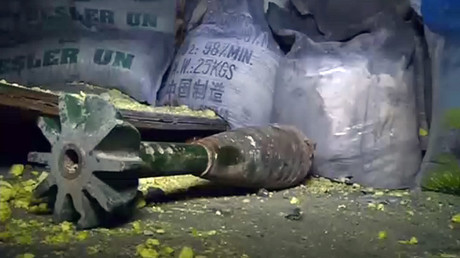Syria hands over evidence of mustard gas attack by rebels on civilians to OPCW (VIDEO)
Syrian authorities have handed over a batch of documents with the evidence of a rebel use of banned chemical agent against civilians near Aleppo to the international chemical watchdog. Samples from the shell containing mustard gas are to be delivered to The Hague.
The documents were handed over in Damascus to the mission of the Technical Secretariat of the Organization for the Prohibition of Chemical Weapons (OPCW).
The mission, comprising eight experts from the US, the UK, Australia, Slovakia and Slovenia has been working in Damascus at the request of the Syrian government since December 12.
The mission, comprising eight experts from the US, the UK, Australia, Slovakia and Slovenia has been working in Damascus at the request of the Syrian government since December 12.
“We have provided all the documents to the mission, they were vetted and accepted. The mission will come to Syria one more time to collect samples, which will be subsequently analyzed,” said Samer Abbas, spokesman for the Syrian National Authority monitoring the implementation of the Chemical Weapons Convention, the Russian Defense Ministry said in a statement.
The samples are expected to be delivered to The Hague, the site of the OPCW headquarters, by a charter flight in January next year. The samples will be stored in Syria until all financial difficulties linked to their transportation to Europe will be solved.
The samples are expected to be delivered to The Hague, the site of the OPCW headquarters, by a charter flight in January next year. The samples will be stored in Syria until all financial difficulties linked to their transportation to Europe will be solved.
The mortar shell with the chemical was recovered near the village of Maarat Umm Hawsh in Aleppo province on November 16 by Russian experts, who were demining the area. Upon closer inspection, the unexploded crude homemade 240-mm round was found to contain dark liquid.
Russian chemical experts took samples and confirmed that the agent in question was mustard gas. The poisonous substance was widely used during the WWI-era and has been outlawed since 1923.
The shell is believed to have been used in a September 16 attack on the village, in which over 40 civilians were injured, and later treated in the Yusuf al-Azma military hospital in Damascus for symptoms of mustard gas poisoning.
In November, the Russian military handed over all the evidence concerning the attack, including the samples to the Syrian authorities. At the time, the Defense Ministry said that the evidence suggested the gas was homemade rather than supplied by a third party, but did not rule out the possibility.
Officers from the Russian Radiological, Chemical and Biological Defense troops in Syria previously produced evidence of chlorine and white phosphorus usage by militants in Aleppo province. In November, the Russian Defense Ministry reported that the expert found “nine selected samples which confirmed [that the terrorists] had used chlorine and white phosphorus munitions to fill their ammunition.” The traces of the agents were on the fragments of mines, shells and soil from the craters to the southwest of Aleppo, Defense Ministry spokesman Major General Igor Konashenkov said.
Russia has repeatedly called on OPCW specialists to participate in the studying of the samples collected by the Russian experts, pointing to instances of use of banned substances by the militants in east Aleppo, then under rebel control, against civilians in the western neighborhoods.
“Russian specialists found that militants in eastern Aleppo used ammunition with poisonous substances, with the ammo targeting western Aleppo. The collected samples leave no doubt that it’s a toxic agent,” Foreign Minister Sergey Lavrov said in late November. He also blamed OPCW's lack of action on the matter to the “tremendous pressure” it endures “from our Western partners.”
“Russian specialists found that militants in eastern Aleppo used ammunition with poisonous substances, with the ammo targeting western Aleppo. The collected samples leave no doubt that it’s a toxic agent,” Foreign Minister Sergey Lavrov said in late November. He also blamed OPCW's lack of action on the matter to the “tremendous pressure” it endures “from our Western partners.”
https://www.rt.com/news/370653-syria-chemical-aleppo-militants-opcw/


0 Comments:
Post a Comment
Subscribe to Post Comments [Atom]
<< Home